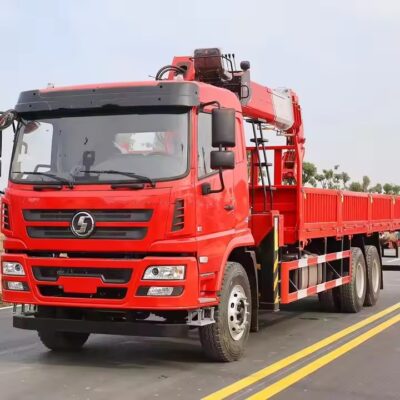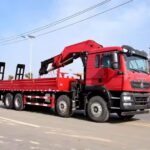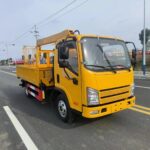ယာဉ်ပြုပြင်ထိန်းသိမ်းမှုလုပ်ငန်းစဉ်၌တည်၏, ချောဆီသည်အရေးပါသောအနေအထားကိုပိုင်ဆိုင်သည်. အဆိုပါအဘို့အတူညီတူညီသောကိုင်ထား ထရပ်ကားတပ်ဆင်ထားသောကရိန်းအထူးမော်တော်ယာဉ်များအတွင်း s. ဒီနေ့, အယ်ဒီတာသည်ချောဆီနှင့် ပတ်သက်. ဗဟုသုတအချို့ကိုတင်ပြလိမ့်မည် ထရပ်ကားတပ်ဆင်ထားသောကရိန်းလူတိုင်းရန်.

ပထမ, ချောဆီကိုပုံစံများသို့လှဲကြစို့. ၏ချောဆီကိုပုံစံများ ထရပ်ကားတပ်ဆင်ထားသောကရိန်းs သည်အမျိုးအစားနှစ်မျိုးပါရှိသည်: ဗဟိုချုပ်ကိုင်မှုလျှော့ချရေးချောဆီကိုနှင့်ဗဟိုချောဆီကို. ဗဟိုချုပ်ကိုင်မှုလျှော့ချထားသည့်ချောဆီကိုရိုးရှင်းသောတည်ဆောက်ပုံ၏အားသာချက်များကိုဂုဏ်ယူသည်, စိတ်ချရသောချောဆီ, ပြုပြင်ထိန်းသိမ်းမှုလွယ်ကူခြင်း။, နှင့်အနိမ့်ကုန်ကျစရိတ်. ၎င်း၏အားနည်းချက်များဖြစ်ကြသည်: ပြန့်ကျဲချောဆီကိုချောဆီအရည်များနှင့်ပိုမိုရှည်သောရေနံဆေးထိုးကာလကြာချိန်. ဗဟိုချောဆီကိုလက်ဖြင့်ချောဆီကိုချောဆီကိုလက်ညှိုးနှင့်မော်တော်ကားခြောက်သွေ့သောဆီဆီသို့အမျိုးအစားခွဲခြားနိုင်သည်. လည်ပတ်နေစဉ်, ညွှန်ကြားချက်များကိုလိုက်လျောညီထွေဖြစ်အောင်လုပ်ခြင်းသည်အလွန်အရေးကြီးသည်. အသစ် installed ချောဆီကိုစနစ်များအတွက်, စမ်းသပ်မှုများကိုပြုလုပ်ရမည်. ရေှးဉီးစွာ, ချိတ်ဆက်သူတစ် ဦး ချင်းစီမှဆီမွှေးမှဆီစီးဆင်းသည်အထိချောဆီခွင်တစ်ခုစီနှင့်ချိတ်ဆက်ထားသောဌာနခွဲပိုင် convert convertors များကိုဖြုတ်ချသည်. ချောဆီကိုညွှန်ပြခြင်းမပြုမီ, ချောဆီကိုအမဲဆီ၏ပိုက်အတွင်းကျန်ရှိနေသေးသောအမှိုက်မရှိကြောင်းစစ်ဆေးပါ. အထူးဂရုပြုမှုကိုအဝေးဆုံးအချက်ဆီသို့ ဦး တည်ညွှန်ကြားသင့်သည်. ချောဆီစနစ်အတွင်းယိုစိမ့်မှုမရှိသင့်ပါ.
ချောဆီစနစ်မှာယိုစိမ့်မှုရှိသည့်အခြေအနေကိုမြင်ယောင်ကြည့်ပါ, အရာတစ်ခုတည်းသောရေနံကိုချောဆီမီးစွန့်ပစ်ပစ္စည်းတစ်ခုသာမဟုတ်ဘဲချောဆီကို၏ထိရောက်မှုကိုအလျှော့ပေးလိုက်လျော, components ၏ wear နှင့်မျက်ရည်မြှင့်တင်ခြင်း.
ညိုညို, ၎င်းသည်ချောဆီကို၏ layout ဖြစ်သည်. ၏ချောဆီ၏ချောသောအချက်များဖြန့်ဖြူး ထရပ်ကားတပ်ဆင်ထားသောကရိန်း အောက်ပါအတိုင်းခန့်မှန်းခြေအားဖြင့်ဖြစ်ပါတယ်: နှစ် ဦး စလုံး hook စက်သီးရိုးနှင့်ချိတ်ခွံအခွံမာသီးအောက်ရှိတွန်းအားပေးနှစ်ခုလုံး; သတ်မှတ်ထားသောစက်ဆုပ်ရင့်သောစက်ရိုး၏အစွန်းနှစ်ခုလုံး; သံမဏိဝါယာကြိုးကြိုး; တစ်ခုချင်းစီကို Reducer; တစ်ခုချင်းစီကိုဂီယာနားချင်းချိတ်ဆက်; တစ်ခုချင်းစီကို bearing ထိုင်ခုံ; မော်တာ bearing; ဘရိတ်အပေါ်တစ် ဦး ချင်းစီပတ်တပ္မျှအမှတ်; ရှည်လျားသောထန်းစိုင်းဘရိတ်၏လျှပ်စစ်ဖက်၏လျှပ်စစ်; ပြောင်းပြန် Idler ဘီး; အဆိုပါကေဘယ်လ် Reel; လမ်းညွှန် roller; ဂီယာ, ရထားလမ်းအပေါ်ဝက်အူချောင်းတွေနှင့်တစ် ဦး ချင်းစီပတ်တာအမှတ်တစ်ခုချင်းစီကို Hinge အမှတ်; Skew အလိုအလျောက်ညှိနှိုင်းမှုကိရိယာ, နောက် ... ပြီးတော့.

ဤဆီသို့ချောဆီ၏တည်နေရာကိုနားလည်ခြင်းသည်ပြည့်စုံပြီးထိရောက်သောချောဆီကိုသေချာစေရန်အတွက်အလွန်အရေးကြီးသည်ကိုနားလည်ခြင်းသည်အရေးပါသည်, ထိုသို့သောအားဖြင့်ပွတ်တိုက်ခြင်းနှင့်ဝတ်ဆင် minimize.
နောက်ဆုံး, အဆိုပါ၏ချောဆီများအတွက်ကြိုတင်ကာကွယ်မှုများ ထရပ်ကားတပ်ဆင်ထားသောကရိန်း ထို့အပြင်အလေးပေးခံရသင့်ပါတယ်: ချောဆီကိုချောဆီကိုသန့်ရှင်းစွာထိန်းသိမ်းထားရမည်, နှင့်ကွဲပြားခြားနားသောကုန်အမှတ်တံဆိပ်နှင့်ချောဆီလျော်သောအမဲဆီ၏အဆင့်ရောနှောမထားရ. ချောဆီစနစ်၏တံဆိပ်ခတ်ခြင်းအခြေအနေကိုမကြာခဏစစ်ဆေးရန်နှင့်ပုံမှန်ကြားကာလများတွင်ချောဆီကိုအမဲဆီထည့်ရန်လိုအပ်သည်. ချောဆီရေနံဆားကစ်ကိုညှစ်ခြင်းသို့မဟုတ်တိုက်မိခြင်းမရှိသေးပါ. ပိုက်လိုင်းဖျက်သိမ်းရန်လိုအပ်သောအခါ, ပျက်စီးမှုသို့မဟုတ်ညစ်ညမ်းမှုကိုရှောင်ရှားရန်ပိုက်အဆုံးနှင့်ဆက်သွယ်မှုများကိုကာကွယ်စောင့်ရှောက်ရမည်. ပြန်လည်တပ်ဆင်တဲ့အခါ, ဆက်သွယ်မှုရှိဖုန်များကိုရေနံဆားကစ်၏သန့်ရှင်းမှုကိုအာမခံရန်သေချာစွာဖယ်ရှားပစ်ရမည်. ဆက်သွယ်မှုယန္တရားတစ်ခုစီတွင်ချောဆီလျှပ်စစ်ဆီသို့မဆီကိုအဟန့်အတားမရှိပါ, ပိန်သောအိုးများသည်အစိတ်အပိုင်းများ 0 တ်ဆင်မှုများကိုလျှော့ချရန်နှင့်သံချေးကိုကာကွယ်ရန်ပုံမှန်အလှည့်ကျနေသောကွာဟချက်တစ်ခုချင်းစီတွင်ပုံမှန်ပြုလုပ်ရန်အသုံးပြုသင့်သည်.
၏ချောဆီ ထရပ်ကားတပ်ဆင်ထားသောကရိန်း သယ်ယူပို့ဆောင်ရေးယာဉ်ကိုတိကျမှန်ကန်စွာကွပ်မျက်ရမည်. သာဤထုံးစံ၌သာ၏ဝန်ဆောင်မှုဘဝနိုင်ပါတယ် ထရပ်ကားတပ်ဆင်ထားသောကရိန်း ထိရောက်စွာကြာရှည်လိမ့်မည်.
ကဲ, ၏ချောသောနှင့်ဆက်စပ်သောနောက်ထပ်ရှုထောင့်များနှင့်ထည့်သွင်းစဉ်းစားအချို့ကိုစူးစမ်းလေ့လာကြပါစို့ ထရပ်ကားတပ်ဆင်ထားသောကရိန်း၎:
သင့်လျော်သောအမျိုးအစားနှင့်ချောဆီတန်းအဆင့်ကိုရွေးချယ်ခြင်းသည်အလွန်အရေးကြီးသည်. မတူညီသောအစိတ်အပိုင်းများနှင့်လည်ပတ်မှုအခြေအနေများသည်စွမ်းဆောင်ရည်ကိုသေချာစေရန်ချောဆီအတွက်တိကျသောကွဲပြားခြားနားမှုများနှင့်ထပ်ဆောင်း package များလိုအပ်နိုင်သည်. ဥပမာအားဖြင့်, အပူချိန်မြင့်မားသောသို့မဟုတ်လေးလံသောဝန်အစိတ်အပိုင်းများသည်အပူခံနိုင်ရည်နှင့်ဆန့်ကျင်သောဂုဏ်သတ္တိများနှင့်အတူချောဆီကိုလိုအပ်စေနိုင်သည်.
ချောဆီ၏ကြိမ်နှုန်းသည်လည်း operating ပတ်ဝန်းကျင်ကဲ့သို့သောအချက်များပေါ်တွင်လည်းမူတည်သည်, အသုံးပြုမှုပြင်းထန်မှု, နှင့်ရိန်း၏တိကျသောဒီဇိုင်း. ဖုန်ထူသို့မဟုတ် corrosive ပတ်ဝန်းကျင်၌တည်၏, ပိုမိုဆီသို့ 0 င်ရောက်ခြင်းကို 0 င်ရောက်ခြင်းနှင့်မထိခိုက်စေဘဲညစ်ညမ်းမှုများကိုတားဆီးရန်ပိုမိုမကြာခဏဆီမွှေးများလိုအပ်သည်.

ချောဆီ၏အခြေအနေကိုပုံမှန်စောင့်ကြည့်လေ့လာခြင်းသည်မရှိမဖြစ်လိုအပ်သည်. ၎င်းသည်ညစ်ညမ်းမှုလက္ခဏာများကိုစစ်ဆေးခြင်းပါဝင်နိုင်သည်, ကပ်စေခြင်း, သို့မဟုတ်ပျက်စီးခြင်း. အရောင်ပြောင်းလဲမှု, အနံ့, သို့မဟုတ်ချောဆီ၏ရှေ့နောက်ညီညွတ်မှုပြ problem နာကိုညွှန်ပြခြင်းနှင့်အစားထိုးသို့မဟုတ်အပိုဆောင်းပြုပြင်ထိန်းသိမ်းမှုလိုအပ်ပါတယ်.
စံ lirpirtiation အချက်များအပြင်, အချို့သောလျှို့ဝှက်ထားသည့်သို့မဟုတ်ထိုထက်နည်းသောလက်လှမ်းမီနိုင်သောဒေသများသည်လျစ်လျူရှုမှုဆီသို့လက်လွှတ်ဆုံးရှုံးနိုင်သည်. ပြည့်စုံသောလွှမ်းခြုံမှုသေချာစေရန်အတွက်ပြုပြင်ထိန်းသိမ်းမှုကြားကာလများတွင်အထူးဂရုပြုသင့်သည်.
ချောဆီကိုအစားထိုးသောအခါ, အစိတ်အပိုင်းများကိုလုံးလုံးသန့်ရှင်းရေးနှင့်ချောဆီကိုမည်သည့်အကြွင်းအကျန်များသို့မဟုတ်ညစ်ညမ်းမှုကိုမဆိုလျှော့ချနိုင်သည့်မည်သည့်အကြွင်းအကျန်သို့မဟုတ်ညစ်ညမ်းမှုကိုမဆိုဖယ်ရှားရန်လိုအပ်သည်.
၎င်းသည်ချောဆီကိုဇယားကိုတည်ဆောက်ခြင်းနှင့်မည်သည့်အချိန်တွင်မည်သည့်အချိန်တွင်မည်သည့်အချိန်တွင်မည်သည့်အချိန်တွင်နှင့်မည်သည့်အစိတ်အပိုင်းများကိုဆီမဆီကိုစောင့်ရှောက်ရန်လည်းအကျိုးရှိသည်. ၎င်းသည်မည်သည့်ဒေသများမျှလွဲချော်ရန်နှင့်ပြ esh နာဖြေရှင်းခြင်းနှင့်ပြုပြင်ထိန်းသိမ်းမှုစီမံကိန်းရေးဆွဲခြင်းအတွက်သမိုင်းကြောင်းကိုသမိုင်းမှတ်တမ်းများပေးရန်သေချာစေသည်.
နောက်ဆုံး, သင့်လျော်သောချောဆီနည်းစနစ်များပေါ်တွင်လေ့ကျင့်ရေးထိန်းသိမ်းရေး 0 န်ထမ်းများအားသင့်လျော်သောချောဆီနည်းစနစ်များနှင့်မှန်ကန်သောလုပ်ထုံးလုပ်နည်းများကိုလိုက်နာခြင်း၏အရေးပါမှုသည်ချောဆီအဆင့်၏ထိရောက်မှုကိုတိုးတက်စေပြီးအလုံးစုံယုံကြည်စိတ်ချရမှုနှင့်သက်တမ်းကိုအထောက်အကူပြုနိုင်သည် ထရပ်ကားတပ်ဆင်ထားသောကရိန်း.
နိဂုံးချုပ်အားဖြင့်, များအတွက်ချောဆီလျော်သောအလေ့အကျင့်၏ပြည့်စုံသောနားလည်မှုနှင့်စေ့စပ်အကောင်အထည်ဖော်မှု ထရပ်ကားတပ်ဆင်ထားသောကရိန်းS သည် 0 တ်ဆင်ခြင်းကိုအနည်းဆုံးမရှိမဖြစ်လိုအပ်သည်, ပျက်ကွက်ကာကွယ်တားဆီး, နှင့်လုပ်ငန်းလည်ပတ်မှုသက်တမ်းနှင့်ဤအရေးပါသောပစ္စည်းကိရိယာများ၏စွမ်းဆောင်ရည်ကိုတိုးမြှင့်.
ဆက်စပ်ပို့စ်များ:

















